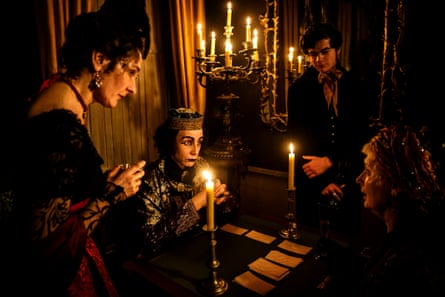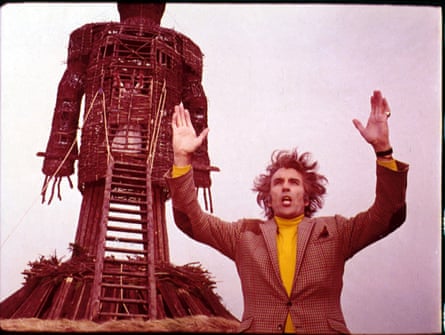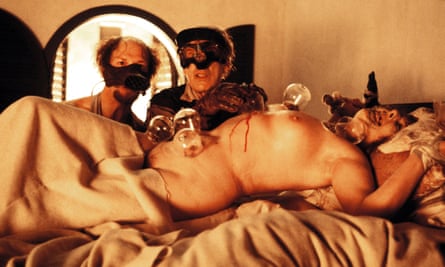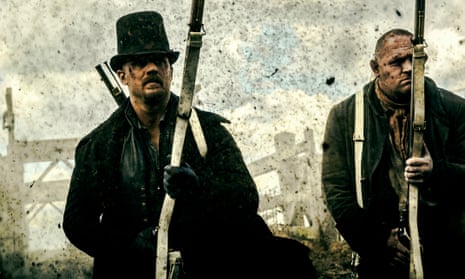There’s been a lot of talk about Tom Hardy’s Taboo, not all of it positive. The drama has been dismissed as “ponderous” and “lacking in substance”, accused on this site of being the ultimate in “frustrate watching” and been the subject of reports suggesting that it has left its star £2m out of pocket.
As we head for the last episode and James Delaney’s final showdown with the East India Company, I’m here to tell you the naysayers are wrong. Hardy is in fact a misunderstood genius and the melodramatic Taboo is the most entertaining drama currently on TV. What’s more, it’s operating out of a British tradition that has been unfairly sidelined in favour of more straightforward fare.
For far too long, British period drama has followed a single template. Whether serious (Wolf Hall) or breezy (Downton Abbey) it operates through the prism of heritage history, packaging up the past into easily digestible chunks.

This type of historical drama is generally accurate (or in the case of Downton, has a passing acquaintance with accuracy) and largely sensible, its edges tidied to ensure that even the most harrowing moments are palatable at 9pm on a Sunday night. The results are sometimes wonderful (Wolf Hall), often pretty good (War and Peace) and occasionally no more than enjoyable fluff (Downton) but they are all recognisably from the Masterpiece Theatre school of historical drama. The glory of Taboo is that it is not.
Instead Hardy’s passion piece (or vanity project if you’re feeling cruel) is big, bold and brash. It’s a heady stew of gothic revenge tale and colonial critique that draws on everything from Charles Dickens and Wilkie Collins to H Rider Haggard and Joseph Conrad. The sort of drama where men are confined to the Tower of London and women to Bedlam, where the camera lingers lovingly on each mud-spattered urchin and the costumes owe as much to steampunk as historical reality. It’s a vivid fever dream of a show, stuffed full of hallucinations and permanently hinting at supernatural elements that (like Delaney’s long-departed mother) never quite come into focus. As a viewer you can either submit to the madness swirling all round or sigh and give up in disgust.
None of this is by accident. For all the involvement of US cable channel FX, this is still a very British historical drama. It’s just that Hardy, his father Chips and writer Steven Knight are drawing on a very different but equally valid strain – the wild side that flourished in the late 60s and 70s and yet is now too rarely seen.

This is historical drama by way of Hammer House of Horror, the freewheeling filming that made Witchfinder General, The Wicked Lady and The Wicker Man, that Ben Wheatley nods to in A Field in England and of which Ken Russell is king. This kind of period piece cares little for actual historical detail, operating instead under its own weird rules where atmosphere is everything and each plot development comes accompanied by its own sense of creeping dread.
Indeed, Taboo’s greatest strength is that it frequently feels like a lost Russell offshoot. A companion piece to Gothic, his gloriously over-the-top take on the lives of Byron and Shelley, perhaps, in which we peek into what was happening in England two years before the romantic poets told each other ghost stories by the Lake Geneva shores.

Like Gothic, the plot of Taboo walks a fine line between compelling and ludicrous, falling on the right side only because of sterling support (Tom Hollander and Jonathan Pryce are particularly entertaining, while Jessie Buckley brings both sense and sensibility as Delaney’s father’s third and final wife) and the sheer exuberance with which the story unfolds. It’s not enough that Taboo deals with long-buried sins and secrets – there must also be incest and exorcisms, slaves and spies, gunpowder plots and increasingly gruesome deaths.
How aware is Hardy of this particular form of British period drama? Very, surely – and not just because he has the horror dial turned up to the max throughout. Taboo might be full of grime and torment but it’s also dry-witted, shot through with sharp and knowing one-liners (“There’s no point – I’m always like this,” Delaney informed a concerned interlocutor when the man offered to return at a more sober and convenient date) and revelling, as Russell did, in each increasingly barmy plot twist.

Then there’s Hardy’s performance. With his ever-present hat and billowing coat he is a cross between Bill Sikes and Heathcliff, grunting at innocent bystanders, growling “take that fucking dress off now” at his benighted half-sister Zilpha and threatening “extreme violence” to almost everyone. Hanging over it all is the ghost of the late Oliver Reed, who would surely have applauded Hardy’s commitment to unbalancing even the most straightforward of scenes. Yet even at its most hammy – the lurches in accent, the sense that he might also be channelling Richard Burton in his older, take-the-Hollywood-pay-cheque days – Hardy’s performance never falters. This is a deliberate interpretation in which the theatricality is intended to disguise what lies beneath, just as Delaney himself uses his reputation as a monster to hide a cold streak of pragmatism. Like Vincent Price’s unsettling Matthew Hopkins in Witchfinder General or Reed’s tormented priest in The Devils it’s the sort of charismatic turn that holds the eye despite, or perhaps because of, its insanity.
That’s why I can’t help but adore Taboo. Yes, you can call it a vanity project and yes, it does throw the kitchen sink at the plot then hurl the whole bath in afterwards – but it is also prepared to take risks. There will always be those who think Hardy has struck out with this very personal take on the historical drama. I disagree: there’s nothing wrong with taking a big swing at a genre – and in Taboo’s case, it connects.

Comments (…)
Sign in or create your Guardian account to join the discussion